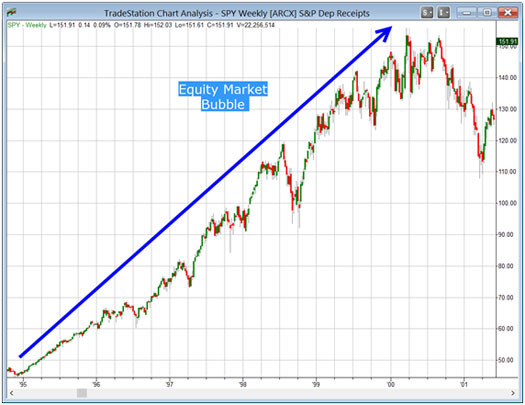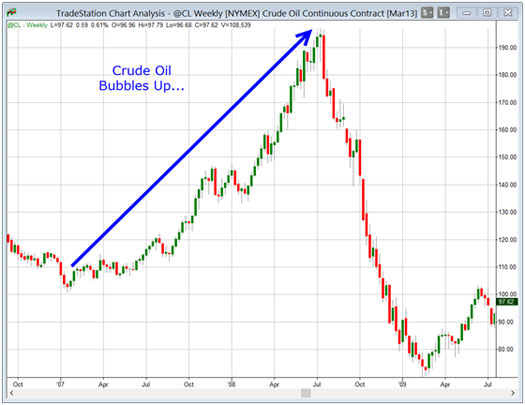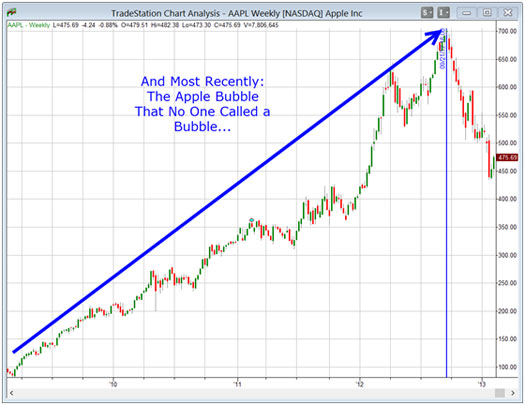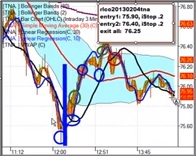Tharp's Thoughts Weekly Newsletter (View On-Line)
-
Article You Like It, So I'll Like It by D.R. Barton, Jr.
-
-
Trading Tip What Trading Expenses Can You Write Off by Robert A. Green, CPA
-
 Buy on February 25 (but not before) And Get These Bonuses... Buy on February 25 (but not before) And Get These Bonuses...
Click here to take a look at the bonus pack and
download the 50-page mini version of the book.
Matrix.VanTharp.com
 Skill and Luck in Trading Part 4: Skill and Luck in Trading Part 4:
You Like It, So I’ll Like It
by D.R. Barton, Jr.
View On-line
How did two albums from the British boy band One Direction get into the top five in 2012 while Jack White’s Blunderbuss couldn’t even crack the top ten? From a critical review perspective, no one would think to put music from two into the same sentence so clearly the sales disparity is not a matter of musical skill. Rather, we could talk about the more obvious impacts of demographics, marketing prowess, etc.
When we look at mass social behavior or crowd psychology, the concept of preferential attachment often comes into play. People tend to take mental shortcuts in decisions making and they do what other people are already doing. Whether or not it’s helpful, social validation is a real driver in many situations.
Preferential attachment relates to another concept that describes dependent outcomes called cumulative advantage. And almost everything that involves human decision making contains a degree of dependency. This means that the current outcome depends on, or is influenced by previous outcomes. Although this effect is fairly easy to observe or understand as with music album sales, we, as traders and investors, have to realize that people buying financial products are not much different from those buying rock and roll (or whatever bubble gum pop category that One Direction falls under…)
Preferential Attachment and Trading
In this series, we’ve been discussing concepts from an interesting new book, The Success Equation: Untangling Skill and Luck in Business, Sports, and Investing by Michael J. Mauboussin. Mauboussin leads his readers through an interesting generalized discussion on preferential attachment, but focuses his discussion of the topic on areas other than the financial world. Let’s do a bit of that now.
Traders need to understand a key distinction—between dependent and independent outcomes. We can start by remembering what independent outcomes look like. Each individual spin of a roulette wheel is an independent outcome, as are successive coin tosses. The probabilities of the outcome remain the same for each event.
In Van’s famous marble game, he simulates independent outcomes by drawing marbles out of a bag that contains different colored marbles and then replacing that marble after every turn. Imagine instead that rather than just putting the pulled marble back in the bag, he put the original marble back plus an extra marble of the same color into the bag after each turn. This would make the marble bag act like someone hearing about a “hot stock” and jumping on the bandwagon. Over time the distribution of the marbles in the bag would change dramatically.
More importantly, the change for any given sequence would be dependent on what colors were drawn early in the game. A clear “path dependency” would exist.
This example makes it relatively easy to see how manias and bubbles happen. While academics continue to argue for efficient markets (probably truer for longer time frames), clearly the shorter and even medium time frames demonstrate inefficiencies with great frequency.
Let’s look at two big bubbles. Here’s the internet bubble ending in 2000:

And now for oil:

As a third example, here’s a fairly current one that wasn’t talked about much as a bubble…

They all have similar characteristics—in the last third of their meteoric ascents, you “had to own them”. Success begot success and everyone piled in, lest they get left behind. This behavior of dependent market action (current activity influenced by recent activity) is magnified in many sectors by the proliferation of the “risk on / risk off” mentality that permeates the markets. As traders and investors, we need to be aware that there are many situations where successive trades are not independent and that capital markets are far less than efficient.
Next week we’ll continue to dig more into dealing with the uncertainty inherent in trading and investing. Until then, I welcome your comments and feedback. Send them to drbarton “at” vantharp.com
Great Trading,
D. R.
About the Author: A passion for the systematic approach to the markets and lifelong love of teaching and learning have propelled D.R. Barton, Jr. to the top of the investment and trading arena. He is a regularly featured guest on both Report on Business TV, and WTOP News Radio in Washington, D.C., and has been a guest on Bloomberg Radio. His articles have appeared on SmartMoney.com and Financial Advisor magazine. You may contact D.R. at "drbarton" at "vantharp.com".
Disclaimer
Trading Education
Workshops
Ken Long Has A New Day Trading Workshop in April!
|
$700 Discounts Expire Next Week
on the Australia Workshops
|
March 1-3 |
Peak Performance 101 - Australia
$700 Discounts Expire Feb 20th. |
March 5-8 |
Peak Performance 202- Australia
|
March 15-17 |
Peak Performance 203 - Australia
"The Happiness" Workshop
|
April 6-7 |
Oneness Awakening Workshop |
April 19-21 |
NEW Day Trading Workshop with Ken Long
|
April 22-24 |
Live Day Trading Sessions with Ken Long
|
May 17-19 |
Swing Trading with Ken Long
|
May 21-23 |
Forex Trading with Gabriel Grammatidis
|
June 20-22 |
Peak Performance 101 |
June 24-27 |
Peak Performance 202
|
Jun 29-Jul 1 |
Peak Performance 203
"The Happiness" Workshop
|
To see the schedule, including dates, prices, combo discounts and location, click here.
Trading Tip
What Trading Expenses Can You Write Off?
by Robert A. Green, CPA
View On-line
Unlike business traders, investors are stuck with restricted itemized deductions. Investors can’t deduct pre-business education such as seminars and travel costs, home-office expenses, start-up costs, and other types of trader expenses.
Investment expenses are only allowed as part of “miscellaneous itemized deductions” in excess of 2 percent of adjusted gross income (AGI), and they aren’t deducted against the alternative minimum tax (AMT). Some taxpayers are better off using the standard deduction versus the itemized deduction and all itemized deductions are subject to a phase-out for upper-income brackets. What’s the bottom line? Many investment expenses wind up on the cutting room floor. If Congress were to flatten the tax code as proposed by the Bowles Simpson Deficit Commissions, they will do away with more itemized deductions, but business deductions are likely to be safeguarded.
Investment-Interest Expenses
Investment-interest expenses are limited to investment income (on Form 4952), with the excess carried over to the following tax years. With trader tax status, investment (margin) interest is treated as a business-interest expense, which is fully deductible on Schedule C or the separate entity business tax return. (Trader tax status is beyond the scope of this article but a critical topic for traders to understand.) Passive spouses/partners in the LLC filing a partnership tax return are required to use investment-interest expense treatment, but the active spouse/partner is entitled to business-interest treatment. Spouses/ partners are considered “active” if they trade or perform administrative duties. If your spouse is passive and if margin interest is material, you may want to give your spouse 1 to 10 percent interest rather than 50 percent interest to avoid investment-interest expense treatment.
Cash vs. Accrual Accounting Methods
A trading business may elect either cash or accrual accounting methods for business expenses only. Trading gains and losses are dictated by other rules, including Section 475 MTM.
Most business traders choose the cash method for expenses— they are deductible when paid, not when they are incurred. The accrual method deducts expenses when incurred. Under the cash method, a credit card charge by Dec. 31 or a check dated on Dec. 31 is considered a year-end tax cash deduction.
Here’s a case where the accrual method may be better: Say a new trader purchases $10,000 of trading training (not classic education) on Dec. 1, 2011. The trader starts classes in December and continues them through March, 2012. The trader commences his trading business halfway through the training in early 2012. The cash method classifies the $10,000 as a start-up cost, with $5,000 deducted in 2012 as amortization and the balance amortized over 15 years. With the accrual method, the trader will have the same amortization amount ($5,000) on his 2012 tax return, and he can deduct the other $5,000 in full as a post-business-commencement education expense in 2012. Pre-business education is a nuanced area that’s widely misunderstood so be certain to consult a trader tax expert on choosing cash vs. accrual accounting.
Start-Up Expenses
Start-up expenses can be capitalized and amortized over 15 years (Section 195). For 2010, there was a special $10,000 first-year expense deduction; provided your start-up expenses were less than $50,000 (other special rules apply too). Congress raised the first-year expense allowance to $10,000 for 2010 only, so it returns to the normal $5,000 amount for 2011. Start-up expenses are limited to “investigating and inquiring” about a new business. Otherwise, they may be capitalized to the cost of an investment in a new business and not amortized at all. Organization expenses ( Section 248) may qualify for an additional $5,000 first-year deduction with the balance amortized on the straight-line basis over 15 years.
Trader Education
Educational expenses incurred after a trading business commences are tax deductible, providing the education maintains or improves your business. Pre-start-up education expenses, however, are a problem for tax-deduction purposes. They’re not business expenses and most do not qualify as “investment expenses” (Sections 212 and 274(h) (7)). We advise some traders to squeeze a reasonable amount of pre-business education expenses into Section 195 start-up expenses, which may be appropriate under certain circumstances.
Trading education isn’t classic secondary school education and, depending on the case, this approach can work. The education has to be in the recent past (within the past six months) and you can only capitalize a reasonable amount. It’s best to consult a trader tax expert about pre-business education expenses. For more information on deducting education expenses, see our three-part blog series “Dangerous entity scams targeting traders”:
Part 1: Dual-entity schemes don’t deliver business treatment without qualification for trader tax status.
Part 2: Are trading education, seminars and travel expenses tax deductible?
Part 3: Education expenses are a problem in dual- entity scheme
Travel, Meals, and Entertainment
Like the seminar itself, travel to seminars is not deductible as investment expenses per Section 274(h) (7). We cover this in detail in our aforementioned blog series on education expenses.
Many traders travel to seminars and workshops taught by industry gurus to further their trading education. Many trading seminars are hosted in world renowned cities and resorts such as Las Vegas and New York City. Traders often take their spouses, who may or may not be included in their trading activities. Travel to an education location is a business expense provided the education qualifies as a business expense too, as their tax treatment is connected. Travel for education, seminars, and conferences looks to the underlying tax treatment of that item itself as either non-deductible investment expense (Section 274(h) (7)), Section 195 start-up cost, or allowable business expense after business commencement. Deducting a trading seminar trip hinges on previously qualifying for trader tax status. The precedent here is a 2008 IRS revenue ruling that says an investor couldn’t deduct travel expenses to and from an investment seminar because the taxpayer didn’t qualify for trader tax status before the trip.
Meals and entertainment with trader colleagues may be tax deductible, but the expenses have to be reasonable. Visit www.irs.gov to learn the many IRS rules on travel, meals, and entertainment-related expense.
About the Author: Robert A.Green is a CPA, managing member and founder of Green NFH, LLC, a tax and accounting firm catering to traders and investment management businesses. Parts of this article were excerpted from Green’s 2012 Trader Tax Guide, available at www.greencompany.com.
Disclaimer
Ken's Class
 In this eight minute video, Ken explains how a swing trade helped him frame two intraday trades in the same ETF on February 11. A “long term” bias in his swing trade and a hesitation informs Ken of a potential setup for intraday continuation of the trend. Watch to see how Ken was able to capitalize on the opportunity using his “turbo” trading techniques. In this eight minute video, Ken explains how a swing trade helped him frame two intraday trades in the same ETF on February 11. A “long term” bias in his swing trade and a hesitation informs Ken of a potential setup for intraday continuation of the trend. Watch to see how Ken was able to capitalize on the opportunity using his “turbo” trading techniques.
http://youtu.be/0Uxt3XpPk98
Ask Van...
Everything we do here at the Van Tharp Institute is focused on helping you improve as a trader and investor. Consequently, we love to get your feedback, both positive and negative!
Click here to take our quick, 6-question survey.
Also, send comments or ask Van a question by clicking here.
Back to Top
Contact Us
Email us at suggestions@vantharp.com
The Van Tharp Institute does not support spamming in any way, shape or form. This is a subscription based newsletter.
To change your e-mail Address, e-mail us at info@vantharp.com.
To stop your subscription, click on the "unsubscribe" link at the bottom left-hand corner of this email.
How are we doing? Give us your feedback! Click here to take our quick survey.
800-385-4486 * 919-466-0043 * Fax 919-466-0408
SQN® and the System Quality Number® are registered trademarks of the Van Tharp Institute
Back to Top |